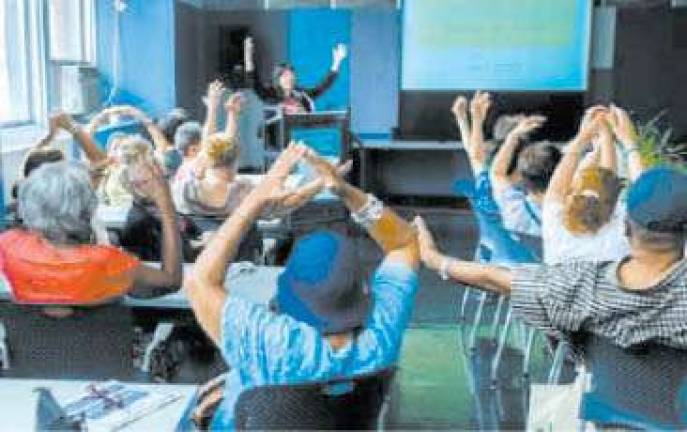The Speaker of the City Council teamed up with a nursing non-profit last week to help seniors prevent falls
Last week, NYC Council Speaker Melissa Mark-Viverito and experts from VNSNY CHOICE, an affiliate of the not-for-profit Visiting Nurse Service of New York, presented a free community health workshop on Falls Prevention for more than 100 East Harlem seniors at the Carter Burden/Leonard Covello Senior Program.
"With simple precautions, we can help prevent seniors in our community from enduring unnecessary, and sometimes life-threatening injuries," said Speaker Mark-Viverito. "I'm proud to partner with Visiting Nurse Service of New York to help elderly residents of East Harlem protect themselves and stay safe in their homes and in their neighborhood."
Falls are the leading cause of fatal and non-fatal injuries for seniors-70 percent of these falls occur in the home. VNSNY Physical Therapist Kathleen Lieu, DPT, PT, CLT provided tips and techniques for avoiding falls, like how to assess a home environment for potential fall hazards, how to choose footwear and ensure walking aids for stability, and how to find local resources that can help seniors be more active in building strength and increasing balance.
Here, Lieu shares some of the workshop's tips on preventing falls among seniors: Staying Safe at Home-use a home safety assessment checklist to review all rooms and outdoor areas; remove clutter on the floor; arrange furniture to widen pathways; keep commonly used items in easy reach; do not use step stools; fix uneven surfaces. Staying Safe Wherever You Are-always wear shoes; use handrails on stairs; avoid wet floors and wipe up spills immediately; be sure chairs and other furniture are stable; check for adequate lighting; consider safety items such as grab bars, raised toilet seats, non-skid tub mats and carry a cell or portable phone for easy access, especially if you live alone. Balance, Strength and Mobility-work on strength and balance by being active; consider activities such as exercise programs, weight training, walking programs, Tai Chi, yoga, and hobbies like bowling, dancing and gardening. Multiple Medications-review all drugs, even over-the-counter ones, with your doctor and pharmacist; always carry a list of your medications; do not share or "borrow" medications; know the common side effects for each drug; and remember to take medications as described. Most importantly, know your PERSONAL risk factors for falls-such as weakness in the legs, previous history of falling, cognitive impairment, dizziness, urinary incontinence, being over age 80, walking and balance problems. For more information visit www.VNSNYCHOICE.org or call 1-855-282-4642.
